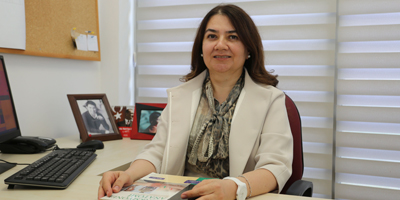EUL Academician Prof. Dr. Meral Demiralp discussed “Delirium and risk factors in the elderly”

European University of Lefke (EUL) Vocational School of Health Services Faculty Member Prof. Dr. Meral Demiralp, addressing “Delirium and its risk factors in the elderly”, drew attention to the fact that delirium is one of the most important issues of geriatric psychiatry.
Prof. Dr. Meral Demiralp explained delirium as a serious deterioration in mental abilities that occurs when the whole brain is affected widely in a short time for any reason, leading to a decrease in awareness of the environment and confusion. Demiralp explained that there are severe impairments in cognitive abilities such as memory, judgment, orientation, especially in consciousness and attention, especially in the 65-year-old and older group, and that sleep rhythm is disrupted and daytime and nighttime sleep are replaced. She stated that it is an acute condition, a syndrome that occurs due to situations.
Demiralp, “Anything that can affect brain metabolism can lead to delirium. Delirium occurs when the normal sending and receiving of signals in the brain is disrupted. This disruption is most likely caused by a combination of factors that make the brain vulnerable and trigger a malfunction in brain activity. “Delirium may have a single cause or multiple causes, such as the combination of a systemic disease and drug toxicity,” she said. Prof. Dr. Demiralp, stated the possible causes as; may be directly related to the brain, such as dementia, infections and tumors; She stated that it may also develop due to systemic and metabolic causes such as congestive heart failure, kidney failure, dehydration, burns, postoperative period, vitamin deficiency, low sodium and low calcium levels.
Delirium is more common in individuals over the age of 65.
Demiralp, who stated that delirium is more common in individuals over the age of 65, added risk factors for elderly individuals; any situation that causes hospitalization especially in intensive care units or after surgery, staying in a nursing home, living alone and lack of stimuli, age over 65, after long and major general surgery and orthopedic surgical interventions, previous delirium attacks, presence of multiple medical problems, vision or hearing disorder, sleep deprivation, long stays in the intensive care unit, invasive procedures, detection and immobility of the patient, dehydration and malnutrition, and presence of dementia.
Stating that 5-42% of hospitalized patients can experience delirium during any period of their stay in the hospital, Prof. Dr. Meral Demiralp, the incidence of delirium; 22-89% in patients over 65 years of age and with dementia, 18-50% after orthopedic surgeries, 85% in end-stage cancer patients, 20% in burn units, 30% in cardiology intensive care units, and 9-15% in surgical services providing post-operative care. .
Noting that in patients over the age of 65 admitted with COVID-19, delirium can develop more easily due to the presence of predisposing factors, isolation, limited interactions with the patient, and the negative consequences of the disease itself. Dr. Meral Demiralp mentioned that the standard management of delirium can be difficult in COVID environments where it is necessary to increase patient isolation.
Explaining that delirium symptoms begin as quickly as a few hours and usually fluctuate throughout the day, Demiralp added that the symptoms tend to be worse during the night, when the weather is dark and everything seems less familiar.
Prof. Dr. Meral Demiralp describes delirium symptoms as “When we look at the general appearance and behavior; Since the patient has fogged consciousness and perception disorder, his external appearance is confused, his usual rapidity has become difficult to understand, restlessness and a tendency to sleep during the day are observed, the patient makes aimless movements. Since cognitive abilities are severely impaired, speech is impaired and a relationship with the patient may not be established. The patient’s orientation to time, place and person is severely impaired, he cannot recognize family members, he is not aware of being in the hospital and time. Visual hallucinations as if an insect is crawling on his body and perceiving the shadows of objects as if they are creatures that will harm him are common, he cannot evaluate the warnings coming from the environment and internally according to reality; The concepts of shame, shame and prohibition may disappear for a while”.
Demiralp gave advice to family members of delirium patients on how to treat the patient.
Finally, stating that the cause of delirium and its symptomatic treatment are important, In the statements made abourt how family members should treat the patient; related to ensuring environmental safety; every time the patient is encountered, the family member introduces himself, talks with the patient in a calm and reassuring tone, ensures the continuity of the caregiver, and establishes a healthy sleep habit; related to maintaining room light during the day, creating a regular daytime program for the patient, ensuring that he/she stays awake during the day, providing orientation; that family members introduce themselves and other people regularly, that their room is adequately lit by the sun, that patient visits are long-term with the same people, not by different people at frequent intervals; arranging an “adaptation to reality board” containing easily readable time, date, day, season, weather calendar and city name, regular physical activity and use of understandable language to increase cognitive stimulation, frequent brief eye contact, patient questions She pointed out that if he does not seem to understand the question, he should use exactly the same words while repeating the question, otherwise the patient will be confused, and he should also pay attention to fluid intake and nutrition, and added that all these practices will increase attention, orientation and memory functions.

1 Comment